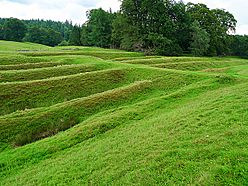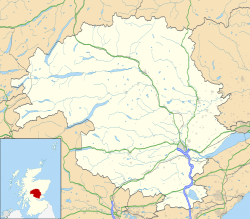Ardoch Roman Fort facts for kids
Quick facts for kids Alauna (?) |
|
|---|---|

Entranceway to the fort
|
|
| Known also as | Ardoch Roman Fort |
| Place in the Roman world | |
| Province | Britannia? |
| Location | |
| Coordinates | 56°16′04″N 3°52′31″W / 56.2678°N 3.8753°W |
| Town | Crieff |
| County | Perth and Kinross |
| Country | Scotland |
Ardoch Roman Fort is an ancient Roman site near the village of Braco in Perthshire, Scotland. It is about 7 miles south of Crieff.
This site holds the remains of a Roman fort, which was like a military base. There are also several "marching camps" here. These were temporary camps built by Roman soldiers as they moved across the land. The site also included a signal tower, used for sending messages. Ardoch was part of the Roman Gask Ridge, a line of forts and watchtowers. It is known as one of the best-preserved Roman camps in Britain. Its earthworks, which are the ditches and banks built by the Romans, are very well kept. Today, Ardoch Roman Fort is a protected historical site.
Contents
What Does Ardoch Roman Fort Look Like?
The remains of the fort are mostly grass-covered earthworks. These are considered some of the best-preserved Roman earthworks in Britain. The site has a long and interesting history. It actually has two forts built on top of each other.
The Older Fort
The first fort is thought to be from the time of Agricola. He was a Roman general who led campaigns in Britain in the 1st century AD.
The Newer Fort
The later fort was rebuilt with two extra outer ditches. This meant the fort had five ditches on its east and north sides for protection.
Other Roman Features
To the north of the main fort, there's a large area called an "annexe." This was an extra space next to the fort. Archaeologists have found evidence of a watchtower, also called a signal tower, here. They have also found at least six overlapping marching camps. These camps were built and used at different times by Roman soldiers.
Ardoch was one of many Roman camps built about a day's march apart. They stretched in a line from north to south. Other Roman camps in this chain include Strageath, Inchtuthil, Battledykes, Stracathro, Raedykes, and Normandykes.
What Was Its Name?
Some people think Ardoch Fort might be the place called "Alauna" in Ptolemy's Geography. Ptolemy was an ancient Greek writer. He wrote that Alauna was in the area where the Damnonii tribe lived. The name "Alauna" might be linked to the River Allan, which flows about a mile south of the fort. However, this idea is not certain.
Ardoch's Later History
The site was used again much later, during the medieval period. A small chapel was built near the center of the fort. Today, you can still see the remains of the graveyard and where the chapel once stood inside the fort.
Interesting Discoveries and Stories
In 1671, a collection of Roman silver coins was found about four miles north of Ardoch. At that time, Lord Drummond wrote that the ditches around the fort were so deep they could hide a man on horseback! He also noted that other trenches nearby had been damaged by farming.
In 1726, a man named Alexander Gordon, who studied old things, claimed a secret underground passage ran from the fort. People said this tunnel went under the River Tay to another fort or "Keir" on Grinnin Hill. This tunnel was also rumored to hold a lot of treasure.
Royal Visit
Queen Victoria and Prince Albert visited Ardoch in 1842. Prince Albert explored the earthworks, but Queen Victoria chose to stay in their carriage.
Who Owns Ardoch Fort Now?
Ardoch Roman Fort is part of the Ardoch estate. It is privately owned, but visitors are usually allowed to access it at reasonable times. To the north, the remains of two Roman marching camps, known as Blackhill Camp, are looked after by Historic Environment Scotland.
 | Selma Burke |
 | Pauline Powell Burns |
 | Frederick J. Brown |
 | Robert Blackburn |


